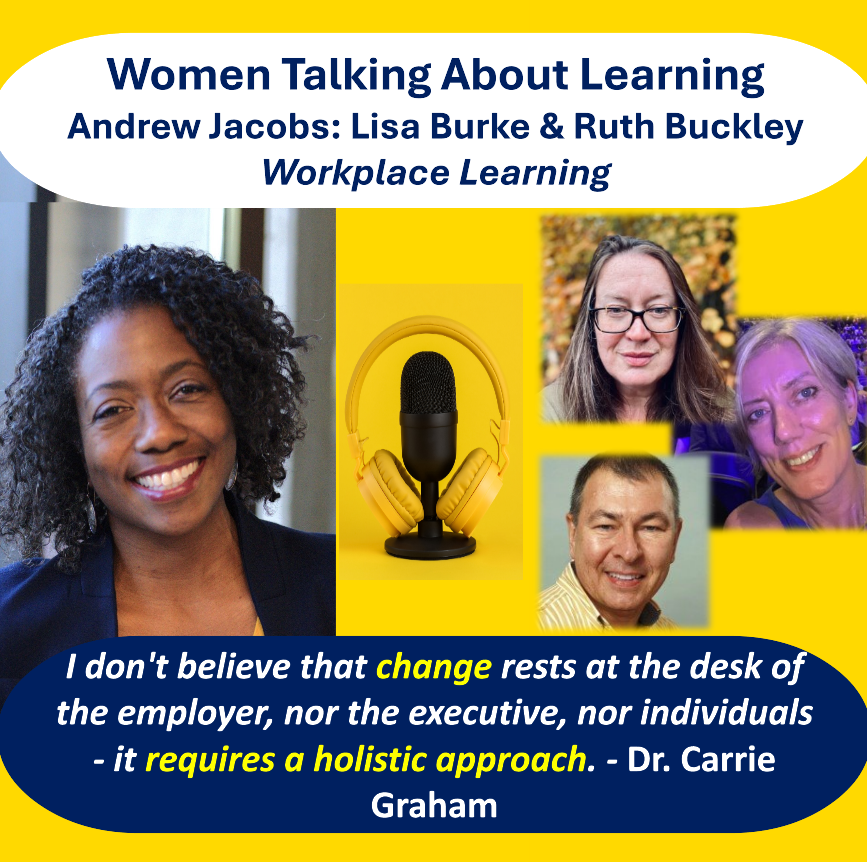Episode Overview
This episode of "Women Talking About Learning" explores workplace learning through the experiences of three remarkable women: Ruth Buckley (forensic consultant for crime scene examination, Metropolitan Police), Lisa Burke (forensics training manager), and Dr. Carrie Graham (learning solutions consultant). The conversation reveals how effective training and development can transform both professional capabilities and personal growth.
Listen Here > https://podfollow.com/the-women-talking-about-learning-podcast/episode/672d8c980cdbdebb4366fa86c11bca9cb997aa7d/view
10 Key Points
- Teaching Enhances Professional Skills: Ruth discovered that delivering training significantly improved her ability to give evidence in court and communicate complex forensic concepts, demonstrating how teaching others develops leadership qualities.
- Authentic Learning Environments Drive Engagement: Lisa transformed traditional classroom-based training by creating realistic crime scene environments, moving away from sterile training rooms to spaces that mirror actual work conditions.
- Tacit Knowledge Requires Special Attention: The challenge of transferring unspoken, experiential knowledge in forensic work highlights the need for innovative training approaches that go beyond traditional instruction methods.
- Diverse Learning Styles Need Accommodation: Successful training and development programs must address varied learning preferences, from hands-on practical experience to theoretical understanding, ensuring all employees can thrive.
- Access Barriers Still Exist for Women: Research reveals that women often face systemic barriers to workplace learning opportunities, including lack of mentorship access and job classification limitations that prevent participation in professional development plans.
- Blended Learning Approaches Maximize Impact: Combining face-to-face training with virtual reality, simulated environments, and flexible scheduling helps empower employees across different shifts and roles.
- Life Experience Informs Teaching Methods: Understanding adult learners' diverse backgrounds and life stages enables more effective training delivery and helps develop stronger leadership skills in facilitators.
- Learning Transcends Work Boundaries: Skills developed through workplace training (emergency life support, mental health first aid) prove valuable in personal life, demonstrating the holistic value of professional development.
- Role Modeling Drives Future Generations: Experienced professionals have a responsibility to inspire and guide newcomers, creating a cycle of continuous learning and development.
- Organizational Culture Must Support Equity: Effective workplace learning requires holistic organizational change, from executive leadership development to ensuring equitable access for all employees.
10 Takeaways/Action Items
- Encourage Teaching Opportunities: Leaders should create opportunities for employees to teach others, as this develops both leadership qualities and deepens their own expertise.
- Redesign Training Environments: Move beyond traditional classrooms to create authentic, realistic learning spaces that mirror actual work conditions and challenges.
- Implement Flexible Learning Schedules: Offer training sessions at different times and in various formats to accommodate shift workers and diverse employee needs.
- Establish Formal Mentorship Programs: Create structured mentorship opportunities to ensure all employees, particularly women and underrepresented groups, have access to guidance and career development.
- Advocate for Learning Access: Employees should speak up about barriers to training participation and request accommodations that enable their professional development plan success.
- Leverage Technology for Inclusion: Use recorded sessions, virtual reality, and online platforms to expand access to training and development opportunities.
- Focus on Transferable Skills: Design training programs that develop skills applicable both in professional settings and personal life, maximizing the value of learning investments.
- Create Safe Learning Environments: Establish spaces where employees can practice, reflect, and repeat skills without fear, building confidence and competence.
- Engage in Cross-Industry Learning: Seek inspiration and best practices from other sectors to enhance your organization's training and development approaches.
- Practice Accepting Recognition: Develop the leadership skills to accept compliments and acknowledge your role as a mentor and role model for others in the organization.
Resources
Listen Here > https://podfollow.com/the-women-talking-about-learning-podcast/episode/672d8c980cdbdebb4366fa86c11bca9cb997aa7d/view
Read > Build Trainings Programs That Drive Performance
Subscribe > C.A.L.M. Email for weekly industry insights
